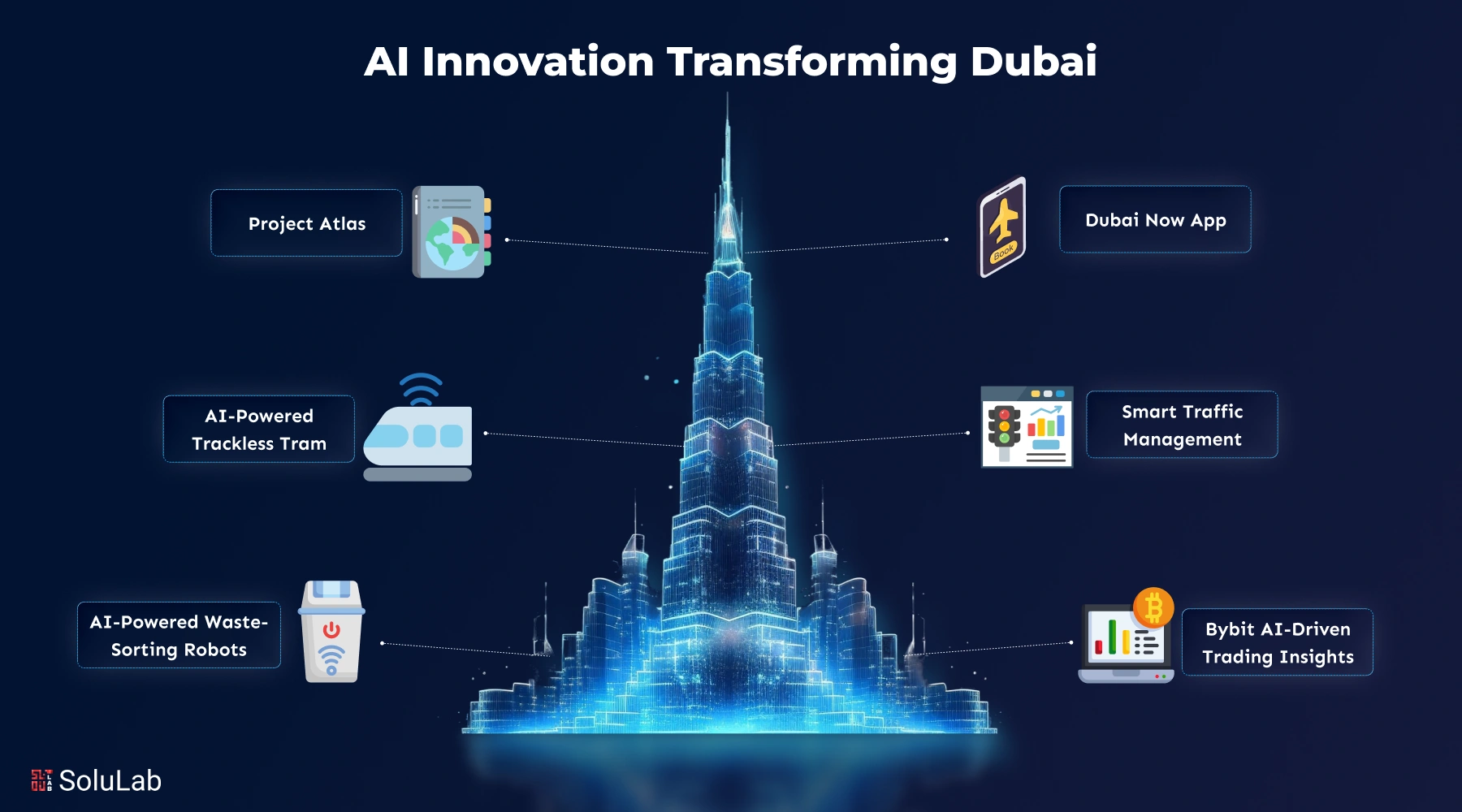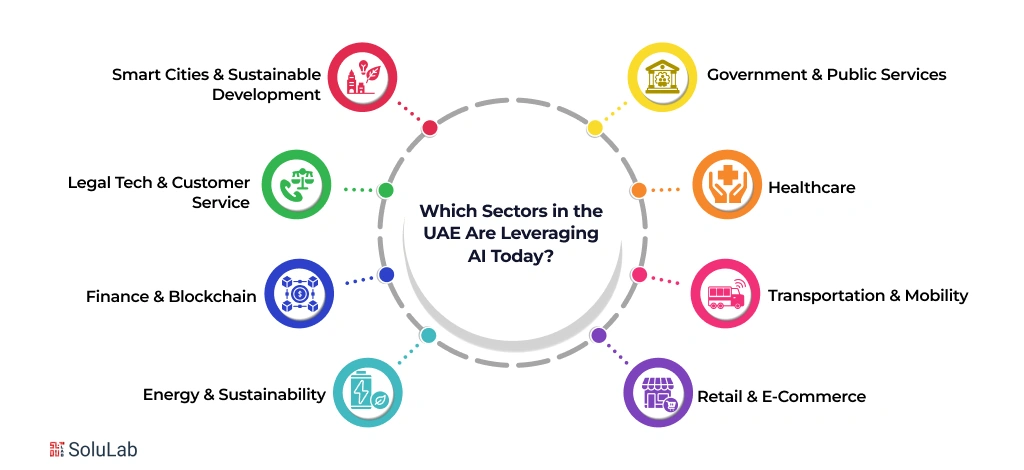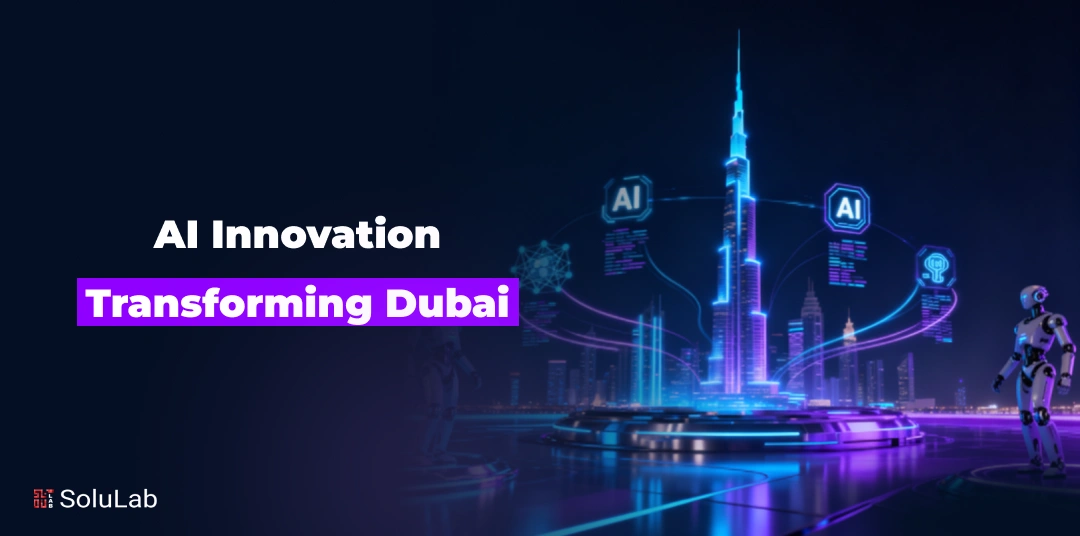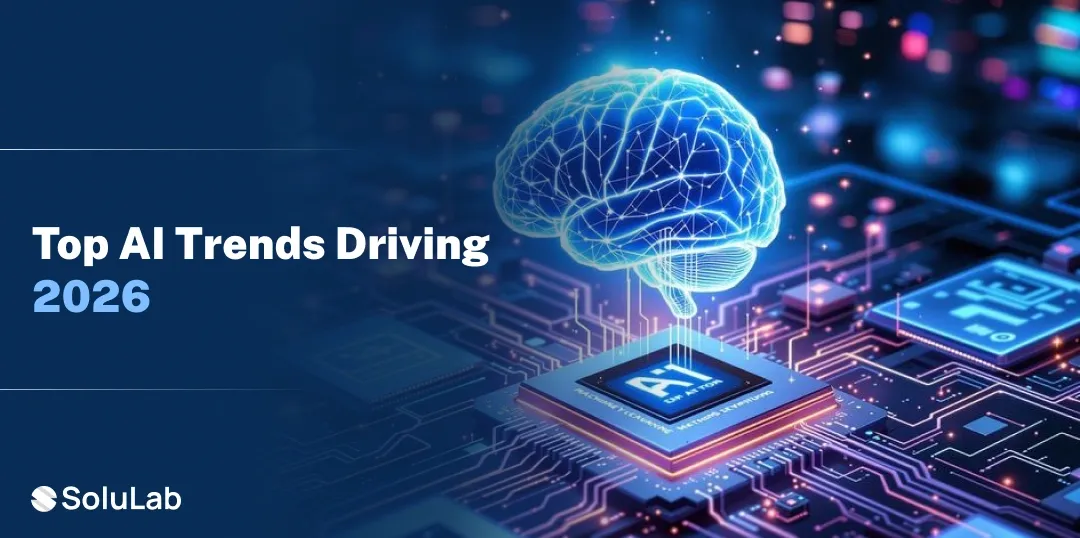
Dubai has always aimed big. Now, it’s doing the same with AI innovations in Dubai. The city is turning artificial intelligence into a major driver of its economy.
| By 2030, experts say AI innovations in Dubai could add nearly 9 to 45% to the UAE’s GDP by 2031, and create a huge USD 335 billion impact across the region. |
For business owners and founders, this means more than just growth, it means opportunity. Companies that act now can be part of this transformation by building smarter systems, saving costs, and reaching customers faster.
Suppose you’re thinking about investing in AI or working with a local AI development company in Dubai. In that case, this guide will help you understand what’s happening, identify the opportunities, and get started.
Why AI Use Cases are Rising in Dubai?
Dubai is becoming one of the world’s top hubs for artificial intelligence (AI). The city has built strong foundations with clear laws, smart strategies, and major funding to support growth.
The Dubai AI Strategy 2031, the creation of a Minister for AI, and the release of new AI Principles show that the government is serious about building a future powered by technology. This focus has already started to attract global investors and innovators.
Foreign investment in technology is growing fast, with billions of dollars flowing into the UAE each year. This growth is creating huge opportunities for both local and international businesses that want to work with trusted AI consulting firms in Dubai.
Many global companies now see Dubai as the perfect base for AI innovation. The city is working hard to attract more startups and AI development companies that set up in Dubai helping build the ecosystem further.
Which Sectors in the UAE Are Leveraging AI Today?
Dubai is using AI in almost every sector, from public services to healthcare, transport, and retail. These real-life examples show how AI use cases are improving efficiency, saving time, and enhancing user experience.
The recent news also indicates that Dubai is gearing up to host GITEX Tech Week 2026. This is the world’s largest technology and AI event, from December 7 to 11 at Expo City Dubai. Announced by Sheik Hamdan bin Mohammed bin Rashid Al Maktoum, the event is set to unite global tech giants, startups, and innovators. Sheik Mohammed bin Rashid Al Maktoum has directed that TechCation become the world’s biggest celebration of technology and creativity.

1. Government & Public Services
Dubai’s government is leading the region in AI innovations. Its goal is to make daily public services faster, easier, and more reliable by using AI in public services in Dubai. Here are some examples:
1. Dubai Now App
The Dubai Now App is one of the best examples of AI use cases in governance. It brings together 170+ public services from paying utility bills to renewing car registrations, all in one place.
In 2024, Phase 2 of the project added 16 new Emirati-focused services, including housing, education, and healthcare support features. The app uses AI-powered recommendations to guide users based on their previous activity, making every experience personalized and faster.
Impact:
- Over 1.8 million users use the app every month.
- Paperwork and physical visits have dropped by 40%, cutting government operational costs.
- User satisfaction has increased to 96%, according to the Digital Dubai Authority.
2. Smart Traffic Management
Traffic is one of Dubai’s biggest challenges, and AI applications are helping fix it. The Roads and Transport Authority (RTA) introduced the UTC-UX Fusion system, which uses AI to monitor traffic through cameras and sensors across the city. The system studies traffic flow and adjusts signals automatically to reduce waiting times at junctions.
Impact:
- Reduces congestion by 10–20% during rush hours.
- Improves fuel efficiency and reduces emissions.
- Cuts manual monitoring costs for the city.
3. Virtual Officer Amna
Meet Amna, Dubai’s first AI-powered virtual police officer. It’s available 24/7 at smart kiosks and online, helping residents and tourists file complaints, ask for guidance, or even locate nearby stations, all through simple conversation.
Amna can speak seven languages and handle everything from lost items to traffic inquiries.
Impact:
- Over 20,000 interactions handled since launch.
- Reduced average service time by 30%.
- Improved accessibility for people who are uncomfortable talking to real officers.
4. AI-Powered Trackless Tram
At GITEX 2025, Dubai revealed its AI-powered Trackless Tram, a futuristic, driverless tram that runs on regular roads without tracks. It uses onboard AI sensors and mapping systems to detect obstacles, adjust routes, and manage braking automatically.
Impact:
- Fully electric and sustainable, with zero carbon emissions.
- Lower setup costs, no need for rail infrastructure.
- Ideal for smart mobility and sustainable transport.
2. Healthcare
Dubai is reshaping its healthcare industry through AI-powered medical innovation. These projects are not just ideas; they are real systems already making hospitals more efficient and patient care more human. For any business exploring AI solutions in healthcare, Dubai is setting global benchmarks. Here are a few examples
1. VR for Pain-Free Treatments at Thalassemia Center
At Dubai Health, doctors are using virtual reality (VR) to make treatments less painful for children with thalassemia. The VR cannulation project, led by Mohammed Bin Rashid University of Medicine and Health Sciences (MBRU), helps patients relax during blood transfusions. Through the headsets and calming 3D visuals, anxiety and pain are reduced by nearly 30%, improving the overall hospital experience.
Impact:
- Enhanced patient comfort, especially for children undergoing frequent treatments.
- Improved treatment compliance, as patients feel more relaxed and cooperative.
- Reduced reliance on sedation or pain medication, minimizing side effects.
- Positive emotional environment, turning stressful hospital visits into calmer experiences.
2. Smartwatches That Track Blood Pressure Accurately
In a collaboration between Huawei and the Dubai Health Authority (DHA), new AI-enabled smartwatches can monitor blood pressure 24/7. These wearables achieved 95% accuracy in tests using the HUAWEI WATCH D2 and This data helps doctors detect heart risks early, and patients can share results directly with their physicians.
Impact:
- Seamless data sharing allows doctors to make quicker, data-driven decisions.
- Empowers patients to proactively manage their cardiovascular health.
- Reduces hospital visits through remote monitoring and timely medical intervention.
3. Enthar — Dubai’s AI System for Early Disease Detection
Dubai launched Enthar, an AI-powered early warning system that can detect outbreaks two weeks before they happen. The system scans global data, news, and travel trends to predict disease risks and alert health authorities in real time. At GITEX Global 2024, this innovation gained global attention as a model for smart city health management.
Impact:
- Opportunities in AI in healthcare in UAE, predictive modeling, and risk management tools.
4. Robotic Process Automation (RPA)
The Dubai Health Authority has introduced AI-powered robotic process automation systems that perform document checks and approvals automatically. Tasks that took 24 hours now take just 2 minutes, a 99% reduction in time. This automation saves over 8,500 working hours a year, letting employees focus on real healthcare work instead of paperwork.
Impact:
- AI applications in healthcare operations that bring cost savings and workflow automation.
- Hospitals actively seek AI consulting firms in Dubai for integration.
5. Hassana — Dubai’s Smart Vaccine and Health Platform
Hassana is a unified system that tracks vaccine records and connects all public and private hospitals in Dubai. It provides real-time updates, monitors inventory, and helps the government manage large-scale health programs efficiently. This level of data connection is rare globally and shows Dubai’s readiness for AI in digital health systems.
Impact:
- Strong demand for AI-powered healthcare platforms.
- Opportunities in health data management and digital health solutions.
3. Transportation & Mobility
Dubai is leading the way in AI in transportation for different industries and smart mobility. Its transport sector is rapidly adopting autonomous and AI-powered solutions that save time, reduce costs, and improve safety. Here’s a detailed look at the top initiatives:
1. RTA Self-Driving Transport Strategy
Dubai aims for 25% of all journeys to be autonomous by 2030. This is part of the RTA’s Self-Driving Transport Strategy.
Impact:
- AED 22B annual economic gain
- 44% transport cost reduction (~AED 900M/year)
- 12% fewer accidents (~AED 2B savings)
- 396M hours saved annually
- 12% lower emissions (~AED 1.5B value)
2. Autonomous Air Taxis
Dubai is testing autonomous air taxis, giving a glimpse of the future of urban transport.
Examples:
- Volocopter 2X: Two passengers, 18 rotors, emergency parachute system, 30-min flight time.
- Joby Aviation (2025 trials): Pilot + 4 passengers, up to 320 km/h, first test flights June 2025, commercial launch 2026.
- EHang EH216-S (Abu Dhabi tests): Two passengers, fully electric, certified pilotless flying taxi.
Impact:
- Cuts commute time significantly (example: Dubai Airport → Palm Jumeirah in 12 minutes instead of 45 by car)
- Supports the Dubai smart city projects by integrating aerial mobility
3. ARIIS Rail Inspection Robot
Dubai Metro now uses the Automated Rail Infrastructure Inspection System (ARIIS), reducing manual labor and improving safety.
Impact:
- Man-hours cut by 75%, from 2,400 to 700.
- Inspections now 75% faster.
- Assessment accuracy up 40%.
- Maintenance costs down 25%.
4. Drone Delivery at Dubai Silicon Oasis
Dubai launched its first drone delivery system in 2024, covering schools, hospitals, and commercial zones.
Impact:
- Phase 1: 6 drones, 4 routes
- 2026 target: 30% of Dubai
- 2030 target: 70% coverage
- Used in food, medicine, essential items, lab samples
5. AI-Powered Trackless Tram – GITEX 2025
Dubai introduced its AI-powered Trackless Tram, a driverless tram that runs on normal roads without tracks.
Impact:
-
- Fully electric, zero carbon emissions
- Lower setup costs, no rails required
- Onboard AI controls speed, route, braking
- Smart urban transport solution
6. Dubai Autonomous Zone (DAZ)
A 15 km dedicated autonomous transport corridor is coming soon.
Impact:
- RoboTaxis, driverless metro, autonomous shuttles, delivery robots
- Integration with smart city projects and AI systems
- Launch will be in Early 2026, but will be full-scale by 2028
4. Retail & E-Commerce
In Dubai, AI in business process automation is changing the way people shop and how businesses serve customers. Smart tools are helping sellers save time and giving buyers better experiences. Here are two real examples that show how AI use cases are making a difference.
1: Sell with AI on Dubizzle
Dubizzle’s Sell with AI feature lets anyone take a photo of an item and instantly get a suggested title, description, category, and price. Even first-time sellers can create listings quickly and easily.
Impact:
- Over 100,000 listings created in the first month, showing fast user adoption.
- Listing creation went from minutes to just a few seconds, saving sellers time and boosting platform activity.
- AI-generated titles and descriptions improved search relevance, making it easier for buyers to find products.
2: Omega AI Assistant at Carrefour & VOX Cinemas
Majid Al Futtaim’s Omega AI platform, powered by AI development companies in Dubai, provides a conversational assistant in multiple languages. Shoppers in Carrefour stores and movie-goers at VOX Cinemas get personalized recommendations and smooth ticket or grocery bookings.
Impact:
- Deployed in 14,000+ stores and used by 125,000 employees across 8 countries, showing it can scale easily.
- Staff reported fast and helpful AI support, making operations smoother.
- Stores became “intelligent media platforms,” engaging customers in real time.
5. Energy & Sustainability
Dubai is using AI applications to make energy and farming smarter, greener, and more efficient. These initiatives show how businesses can adopt AI for better results while supporting sustainability.
1: ADNOC Neuron 5 AI Platform
ADNOC introduced Neuron 5, an AI system that watches pressure, temperature, and vibrations in critical equipment. It predicts maintenance before problems happen.
- Reduced unexpected shutdowns by 50%
- Increased planned maintenance intervals by 20%
- Freed staff to focus on higher-value work
2: Smart Farming with AI & IoT
Dubai smart farms now use soil sensors and AI-powered fertilizer robots. AI helps deliver water and nutrients exactly where crops need them.
- Reduced water use by 30%
- Cut fertilizer waste by 25%
- Improved crop yields by 20%
3: Vertical Farming with AI Analytics
High-tech vertical farms use AI and robotics to control light, humidity, and nutrients.
- Uses 95% less water than traditional farms
- Achieves up to 100× higher yields per square meter
- Produces crops year-round, reducing climate risks
6. Finance & Blockchain
These examples show how AI applications in different industries and AI-driven trading insights are not just improving efficiency, but also creating measurable value for businesses in Dubai’s financial and tech sectors.
1. Bybit AI-Driven Trading Insights
Bybit became the first major crypto exchange in Dubai to use AI-driven trading insights to help traders make smarter decisions. Using AI applications in different industries like finance, machine learning models track order-book changes and social media trends. Traders get real-time signals and risk alerts directly on the platform.
Impact:
- 15% higher average trader ROI in the first three months.
- 30% faster reaction to market changes, improving trade execution.
- 20% growth in daily active users, thanks to better AI tools that support decision-making.
2. Project Atlas: Decentralized AI & Blockchain Platform
Project Atlas is a UAE government–supported project combining AI applications and blockchain to build a secure, decentralized system for sharing data. It uses smart contracts to ensure data cannot be tampered with and helps government and private teams work together faster.
Impact:
- 5x faster data processing, reducing analysis time from hours to minutes.
- 99.9% data integrity with all records safely stored on-chain.
- 40% lower costs for interdepartmental reconciliation thanks to automated workflows.
7. Legal Tech & Customer Service
Dubai is using AI to make legal help and customer service faster, easier, and more accurate. These tools save time for both citizens and businesses by automating tasks that once needed human effort.
1. L and S AI Lawyer
A free AI-powered legal app built in Dubai that gives instant help in 10 languages. It answers legal questions, drafts documents, and follows UAE laws updated by real lawyers.
Impact:
- Solved 50,000+ queries in its first month.
- Scored 92% user satisfaction.
- Cut response time from 24 hours to under 2 minutes.
2. Rammas Chatbot (DEWA)
An AI virtual assistant created by the Dubai Electricity & Water Authority to manage customer requests about billing, power issues, and service updates. It works across both web and mobile platforms.
Impact:
- Resolved 80% of customer queries without needing human support.
- Managed 1 million+ interactions in 2024.
- Reduced wait times by 60%, improving satisfaction scores.
3. AI in Prosecution Workflows
The UAE Public Prosecution uses AI-based document analysis to manage case files, check evidence, and even predict outcomes. These systems help legal teams make faster, more accurate decisions while keeping data private.
Impact:
- Cut document review time by 70%.
- Increased case processing speed by 35%.
- Improved evidence accuracy to 99%.
8. Smart Cities & Sustainable Development
Dubai’s vision of becoming a smart city is powered by AI that helps manage waste, energy, and mobility. These systems lower costs, reduce emissions, and improve city living, all key goals for a sustainable future.
1. AI-Powered Waste-Sorting Robots
At the Jebel Ali Landfill, AI-powered robots now sort recyclable materials using computer vision. They scan, identify, and separate items automatically, cutting down on manual labor.
Impact:
- Automated 60% of the sorting process.
- Boosted recycling by 25%, saving 15,000 tons each year.
- Reduced operation costs by 30%.
2. Smart Building Energy Optimization
AI-based systems in 50 smart buildings in Business Bay control lighting, temperature, and solar energy in real time. These AI applications make buildings greener and more efficient.
Impact:
- Saved 25% in energy use every year.
- Cut costs by USD 8 million.
- Raised comfort scores by 18% among tenants.
3. AI-Powered Trackless Tram
Revealed at GITEX 2025, this driverless tram runs without rails using AI mapping, LiDAR, and radar. It detects obstacles, adjusts speed, and parks automatically, a big leap for smart city projects in Dubai.
Impact:
- Zero carbon emissions and low noise.
- Cut infrastructure costs by 40%.
- Carries up to 200 passengers with a 3-minute frequency.
Why Most AI Companies in Dubai Fail and How to Stand Out?
Dubai’s AI ecosystem is growing fast, but not every company is getting it right. As a business founder, understanding where others fail can help you find your edge.
Most AI consulting firms in Dubai are strong in tech but weak in results. Around 95% of AI projects stop at the pilot stage, they look impressive, but never scale. Many teams focus on models and tools but forget what really matters: business growth and measurable impact.
Even though AI innovations in Dubai are supported by the government, less than half of the AI development companies in Dubai actually follow the full regulatory guidelines or align their products with public policy. This leaves a big gap between what’s being built and what Dubai’s AI vision needs.
Then comes ROI. Only about one in four CEOs in the UAE say their AI investments have delivered the expected returns. The problem is that there is no clear link between AI performance and profit.
This is where your differentiator lies:
- Embedding quantifiable ROI metrics from day one
- Ensuring scalable architectures beyond MVPs
- Aligning solutions with government-supported AI applications
- Forging strategic partnerships with city planners and ministries
Future Scope of Use Cases for AI in Dubai
The next few years will bring a new wave of AI innovations in Dubai that will change how businesses and cities work. It will boost adoption for enterprise AI across different industries:

1. Humanoid Service Robots
By 2028, more than 500 service robots are expected to be working in smart city projects in Dubai. They will help customers in malls, airports, and offices, improving the experience and reducing operational costs.
2. Predictive Student Analytics
Around 70% of schools will use AI-powered learning tools by 2027. These tools will track student progress and suggest better learning paths, helping reduce dropouts by up to 15%. It’s one of the most promising AI applications in different industries, especially education.
3. AI in Space and Satellite Data
By 2026, AI development companies in Dubai will be processing over 10 TB of satellite data daily. This will help with urban planning, weather tracking, and environmental monitoring, a strong sign of how AI use cases are expanding beyond business and into sustainability.
4. Contract-Analysis Algorithms
By 2029, almost 80% of law firms are expected to use AI in public services in Dubai and the private sector for legal contract analysis. These tools will cut review times by 60% and improve accuracy in predicting case outcomes by 20%.
These breakthroughs will be powered by top AI development companies in Dubai and supported by experienced AI solution providers in Dubai. Together, they are helping the government and businesses deliver smarter, faster, and more efficient solutions across sectors.
Conclusion
Dubai’s AI ecosystem is growing fast, backed by government vision, global partnerships, and strong private investments. From healthcare and education to law and retail, the city is seeing real change through AI applications in different industries.
For founders and business leaders, this is the time to act. The best results come from partnering with trusted AI consulting firms in Dubai and a proven AI development company in Dubai that understands both technology and your business goals.
At SoluLab, we help companies adopt future-ready AI solutions, building tools that increase efficiency, improve customer experience, and drive measurable growth. If you’re ready to explore real AI use cases for your business, collaborate with us and start building your future with intelligent technology today.
FAQs
1. What real-world AI projects are driving Dubai’s transformation?
Dubai’s progress in AI innovations is clear. Smart traffic systems have cut congestion by 22%, and AI-powered medical innovation in Dubai helps doctors detect diseases with 95% accuracy. Virtual officers and AI chatbots now handle thousands of public requests, proving how AI in public services in Dubai is reshaping daily life.
2. Which sectors are leading AI adoption in Dubai?
From AI in healthcare in Dubai to transportation, real estate, energy, and legal tech, every major industry is adopting smarter systems. Companies now rely on AI consulting firms in Dubai and AI solution providers in Dubai to improve efficiency, reduce costs, and create better customer experiences.
3. How significant are the benefits of Dubai’s AI projects?
AI is delivering real results. Report validation is now 40% faster, rail inspections take 75% less time, and public services respond 30% quicker. These gains show how AI development companies in Dubai are helping the city’s digital economy grow with measurable impact.
4. What should businesses do to join Dubai Future Accelerators?
To work with the Dubai Future Accelerators, start with a clear proof of concept. Show ROI, ensure data compliance, and collaborate with trusted AI app development companies in Dubai or AI development firms already working in the region.
5. What ethical and regulatory measures guide AI in Dubai?
Dubai’s AI Principles ensure responsible innovation. Every AI solution provider in Dubai must follow strict rules for transparency, data privacy, and fairness, building trust across all AI applications in different industries.






